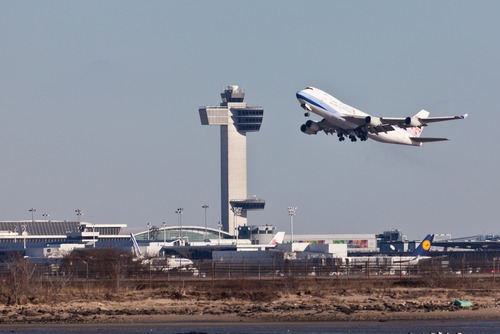
Reforming air traffic control (ATC) is a top priority for U.S. House Republicans when they return to Capitol Hill from their August recess and they’re expected to include it in a reauthorization bill for the Federal Aviation Administration (FAA) that must get passed before Sept. 30.
House members again will push for a floor vote on the 21st Century Aviation Innovation, Reform, and Reauthorization (AIRR) Act, H.R. 2997, a bill introduced this session by Rep. Bill Shuster (R-PA),, proposing the nation’s ATC system become a non-profit that operates separately from the FAA.
Shuster, chairman of the House Transportation and Infrastructure Committee, called it “a must-pass bill” that would create a private nonprofit organization, chartered by Congress to run ATC, that would be overseen by an 11-member board of directors.
H.R. 2997 is also supported by the National Taxpayers Union (NTU), which likewise considers ATC reform to be its number one legislative priority in the transportation policy space “because of its transformational benefits for taxpayers,” NTU President Pete Sepp told Transportation Today.
“For roughly 30 years, we have supported the concept of separating the function of ATC from air safety regulation through a user-funded non-government entity,” Sepp said.
Currently, Sepp explained, the typical middle class air traveler pays an effective tax rate of more than 20 percent on an airline ticket—which he said is “far higher … than he or she is likely to pay on a 1040 federal income tax return.”
“Much of this burden is supposed to pay for air traffic control services, whose federally mismanaged modernization is now years behind schedule, billions over budget and shrinking in scope,” Sepp said.
That cost benefit equation will worsen for travelers “unless and until government recognizes its proper role here as a safety regulator rather than a service provider,” he added.
Charles Leocha, chairman and co-founder of Travelers United, a D.C.-based nonprofit membership organization representing all travelers, echoed those sentiments and said that modernizing America’s ATC system outside of the FAA would save millions of dollars by removing the process from the federal budget process.
“We have been working through the current system for two decades to no avail,” Leocha told Transportation Today.
“Madness is doing the same thing over and over again expecting a different outcome,” he said. “It is time to change our system of running the ATC organization.”
More pocket change
Both Leocha and Sepp offered several ways in which the House bill would save taxpayers money.
“A nongovernmental organization representing all users of the ATC system can provide affordable services which, over time, will be less costly to taxpayers had ATC service remained under government control,” Sepp said.
That has been the case in Canada and other countries where similar plans have produced more accountable, cost-efficient systems that remain ably overseen by government safety authorities, Sepp said.
Additionally, having 21st century technology in place will speed air traffic, allow full use of current airports via new technology and positively impact the environment, Leocha told Transportation Today.
“It is time to enter the 21st century. Enough with the obsolete,” he wrote in an email today.
Specifically, Leocha said upgrading the nation’s ATC infrastructure and reforming oversight would:
- Save millions of gallons of jet fuel;
- Help the environment with dramatic reductions in CO2 emissions;
- Save time on every flight through direct routing;
- Eliminate in-flight air traffic jams;
- Change pilot awareness by showing surrounding aircraft;
- Improve efficiency of airports by allowing up to 30 percent more take-offs and landings; and
- Save millions of dollars in contracting costs through continuous funding.
“Privatization is being used as some trigger-word for a corporate takeover of ATC, when what’s really happening is optimization,” Sepp said.
Under the House plan, the U.S. government would get to do what it does best—regulate safety—“while the new user-funded entity gets to do what is proven to work around the world—provide innovative, fiscally responsible ATC service,” Sepp said.
‘Fat cats’ comment
There’s been some pushback against the House ATC reform bill. One group opposing it is the National Business Aviation Association (NBAA), a Washington, D.C., lobbying group that represents the interests of private and corporate jet owners.
“Companies and communities across the U.S., which rely on general aviation for business, civil services and a host of other needs, simply cannot risk turning over the system to a private board beyond the reach of Congress,” NBAA President and CEO Ed Bolen testified May 17 during a House Transportation and Infrastructure Committee hearing on ATC privatization.
Such a board, Bolen argued, would have a focus on commercial airline operations at large hub airports, in turn potentially creating airport and airspace access restrictions for business aviation in countries with privatized ATC systems.
“In addition to jeopardizing access for general aviation, proponents of privatization want to give power to a board with the authority to determine who gets taxed, and in what amounts,” Bolen said.
Asked what he thought about the NBAA’s opposition to the proposed House bill, Leocha candidly said: “I find it distasteful.”
“These fat cat corporations like Exxon and GE and private individuals like Rush Limbaugh and Bill Gates are the ones who should be paying their fair share,” Leocha said. “This is a system that is rigged in favor of big corporate interests. NBAA wants to keep it that way and keep the public from gaining the benefits.”
Sepp claims NBAA is essentially lobbying against last year’s ATC legislation, which never made it to the floor for a vote.
But this year, H.R. 2997 contains numerous improvements that protect general aviation and give smaller operators in the system a greater voice, he said.
“Opponents keep conjuring up fears about the legislation as if a horde of gremlins will come streaming out once it’s signed into law,” Sepp said. “In fact, no ATC reform structure has ever been more thoughtfully designed than this one.”